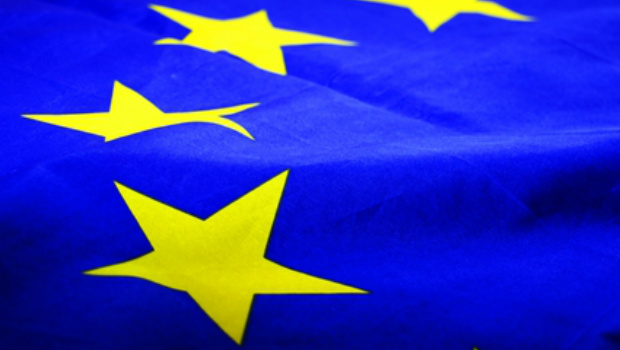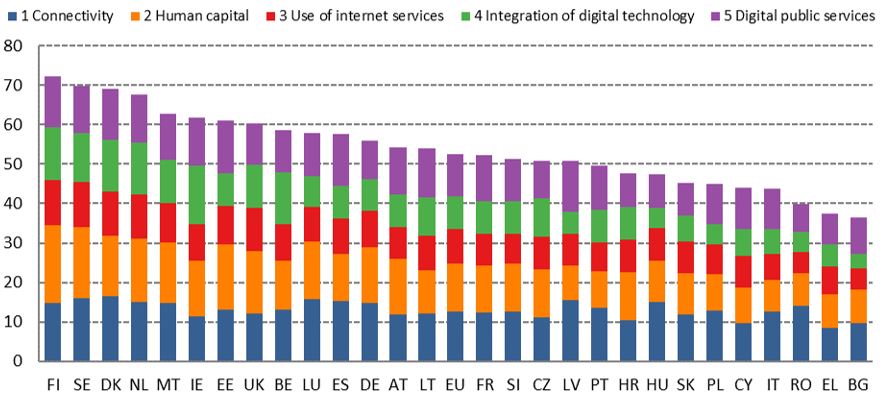
Ireland sixth in Europe for digitisation, report finds
Ireland ranks sixth in Europe for digitisation, according to the latest Digital Economy and Society Index (DESI) report.
The report put Ireland in sixth place with a score of 61.8, which is above the EU average score of 52.6. Furthermore, Ireland was named the fastest growing EU member state of the last five years in the index.
DESI is a composite index designed by the European Commission to assess the development of EU countries towards a digital economy and society. It aggregates a set of relevant indicators structured around five criteria; connectivity, human capital, use of internet, integration of digital technology and digital public services.
The European Commission has been monitoring member states’ digital progress through DESI reports since 2014. The most recent study includes the 27 EU member states as well as the UK, as much of the data was recorded when the UK was still a member of the EU.
While all EU countries improved their digital performance over the past year, Finland, Sweden, Denmark and the Netherlands scored the highest ratings and are among the global leaders in digitalisation. Malta, Ireland, Estonia and the UK followed. Bulgaria, Greece, Romania and Italy obtained the lowest scores on the index.

DESI 2020 demonstrated that the largest EU economies are not digital frontrunners, which, according to a statement from the European Commission, indicates that the speed of digital transformation must accelerate for the EU to successfully deliver on digital and green transformations.
Overview
Based on data gathered prior to the COVID-19 pandemic, DESI 2020 highlighted that Ireland has maintained a leading position in the use of e-commerce by SMEs, and in the integration of digital technology.
Further, Ireland entered the top ten for use of internet by individuals and recorded a notable increase in its share of internet users. It also maintained its top ten position in digital public services, where it excelled in open data and the provision of digital public services for businesses.
There was no substantial change in Ireland`s position in the human capital and connectivity dimensions despite some improvement in key indicators, such as the digital skills of the wider population.
Connectivity
Ireland fell from 22nd to 23rd position year-on-year, with a score of 45.7. Its best performance came from its fast broadband (NGA) coverage, where it ranked sixth with 96% coverage, compared to the EU average of 86%. While fixed very high capacity network (VHCN) coverage jumped from 13% in 2019 to 21% in 2020, it still lagged behind the EU average of 44%. Additionally, Ireland was found to be one of the EU’s most expensive countries in terms of broadband (ranking 27th, with a broadband price index of 45, compared to the EU average of 64).
Denmark had the highest score in connectivity, followed by Sweden, Luxembourg, Latvia and Spain. The UK placed 20th, while Slovenia registered the lowest score.
Human capital
Ireland remained in 11th place in the human capital dimension this year, as it did last year. However, it scored above the EU average (49.3 versus 56.4) due to its relatively high ranking in the indicators on high-level ICT skills and female ICT specialists. Ireland also boasted the second largest proportion (7%) of ICT graduates among all graduates. However, while the proportion of ICT specialists in the overall workforce (4.3%) was above the EU average (3.9%), more than half of the firms that tried to recruit such specialists experienced difficulties.
According to the data, Finland was the leader in the human capital dimension, followed by Sweden, Estonia, the Netherlands and the UK. Conversely, Italy, Romania and Bulgaria ranked the lowest.
Use of Internet services
Ranking in eighth place, Ireland rose four places in the use of internet services category this year. Its number of internet users increased significantly (from 80% to 88%) and exceeded the EU average of 85%. It revealed that Ireland’s most popular online activities were entertainment (music, videos, games), followed by the news, banking and social networks.
Finland, Sweden, the Netherlands and Denmark had the most active internet users, followed by the UK, Malta, Estonia and Ireland. Romania, Bulgaria and Italy were found to be the least active. Ireland and Spain recorded the largest year-on-year improvement with respective increases of 7% and 8%.
Integration of digital technology
Ireland maintained the top position in the integration of digital technology category. SMEs in Ireland excelled in e-commerce, where Ireland led in all three indicators – selling online, e-commerce turnover and selling online cross-border. Indeed, 29% of Irish SME’s turnover came from online sales, which is almost three times the EU average of 11%. Further, Irish companies ranked relatively high on the use of big data (20%), cloud services (33%) and social media (44%).
Top performers in digital technology were Ireland, Finland, Belgium, the Netherlands, Denmark and Sweden. Bulgaria, Romania, Hungary Poland, Greece and Latvia lagged in this category.
Digital public services
Ireland ranked ninth among EU countries in digital public services. While it fell one place year-on-year, it remained above the EU average of 72 with its score of 80.6. Ireland scored 91% in open data and a near perfect 99% in digital public services for businesses. The report found that 76% of internet users in Ireland who had to submit forms to public services did so online, which is above the EU average of 67%. However, Ireland’s performance in indicators measuring the quality of services for the public (pre-filled forms, online service completion) was average.
The top performers were Estonia, Spain, Denmark, Finland and Latvia, all of which had scores greater than 85. The UK ranked sixth, with a score of 70.8, while Romania, Greece, Croatia, Slovakia and Hungary all scored less than 60.
“The latest edition of the European Commission’s Digital Economy and Society Index (DESI) ranks Ireland number one in Europe for the integration of digital technologies by enterprises by a significant margin, ahead of Finland, Belgium, the Netherlands, Denmark, and Sweden,” began a statement from IE Domain Registry on the DESI 2020 results. “It also positions Ireland as the leader for buying and selling online, with 29% of our enterprises active on online marketplaces.
“On the surface, it looks like Ireland has all the necessary ingredients for a healthy digital economy. On closer inspection, however, using the DESI as a metric for Ireland’s e-commerce health, especially for SMEs, is misleading,” the statement continued. “The DESI classifies ‘small enterprises’ as businesses that have between 10 and 49 employees; it excludes ‘micro-enterprises’, or businesses that employ fewer than ten people. Micro-enterprises make up more than 92% of the Irish economy.
SME Digital Health Index
IE Domain Registry argued that its own SME Digital Health Index, which collates the digital experiences of 1,000 Irish SMEs and micro-businesses, “paints a more accurate picture”.
Its most recent survey in 2019 showed that just 32% of SMEs with a website had the ability to receive sales orders through it; furthermore, only 32% could fully process sales transactions through their website.
“E-commerce is worth €12 billion to the Irish economy, so this is a glaring missed opportunity for Irish SMEs without the digital tools needed to reap the value of e-commerce for their business,” the statement read. “However, in this new COVID-19 world, there is evidence that savvy Irish SMEs are rapidly going online – there were 7,000 new domain registrations in May 2019, the highest on record, indicating that businesses view their web site as an essential sales platform .”
Julia O’Reilly




Subscribers 0
Fans 0
Followers 0
Followers